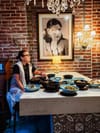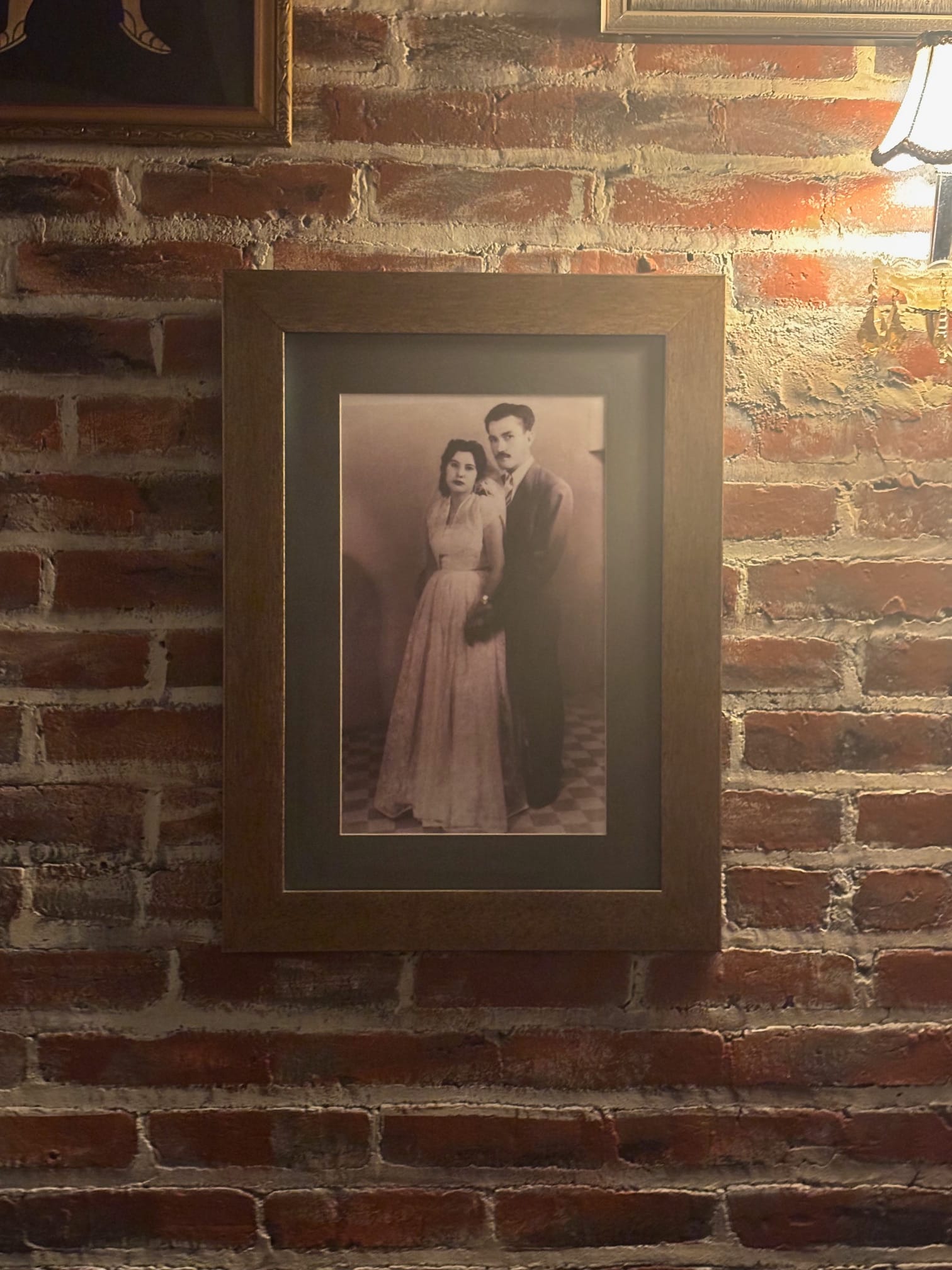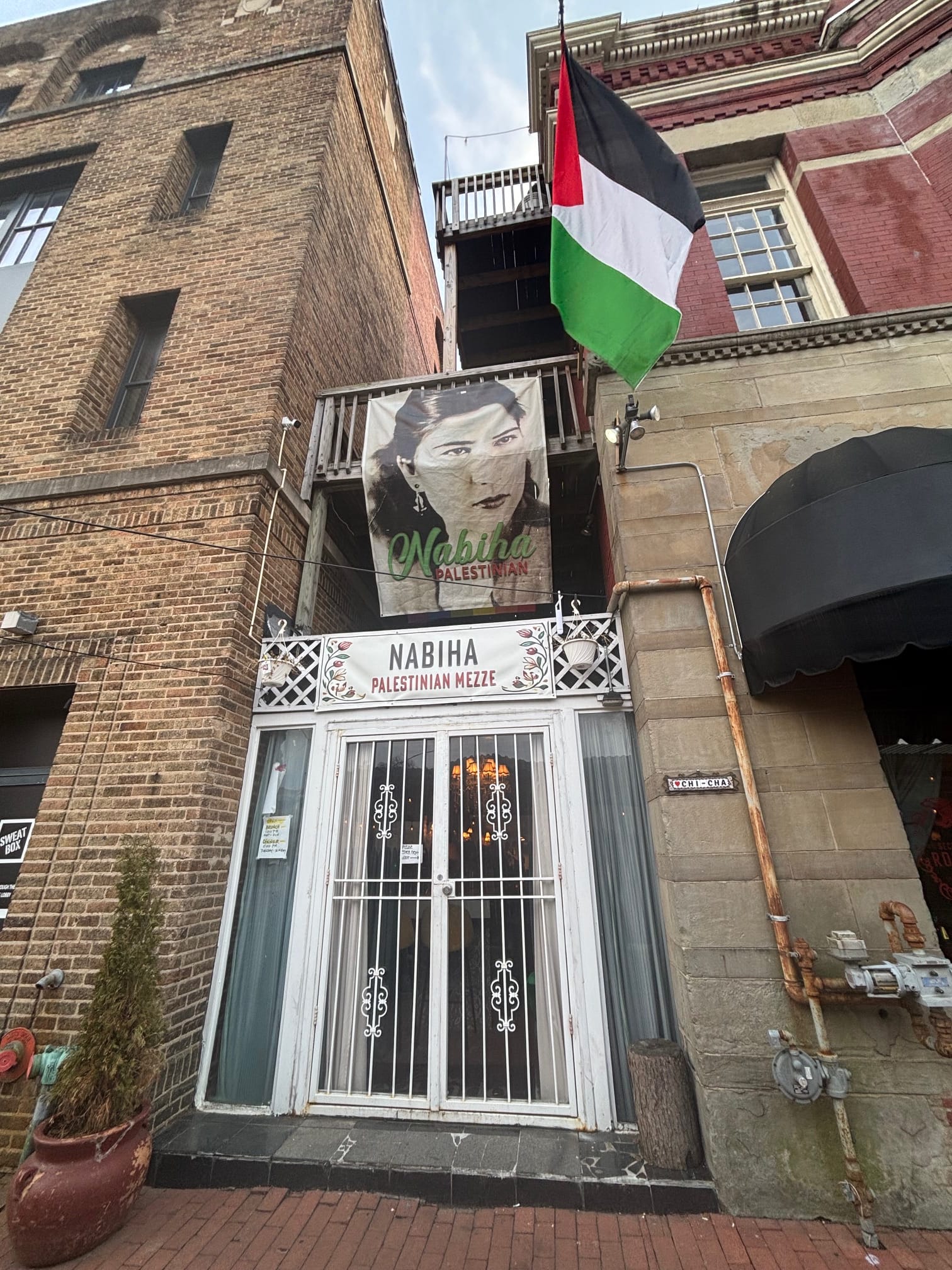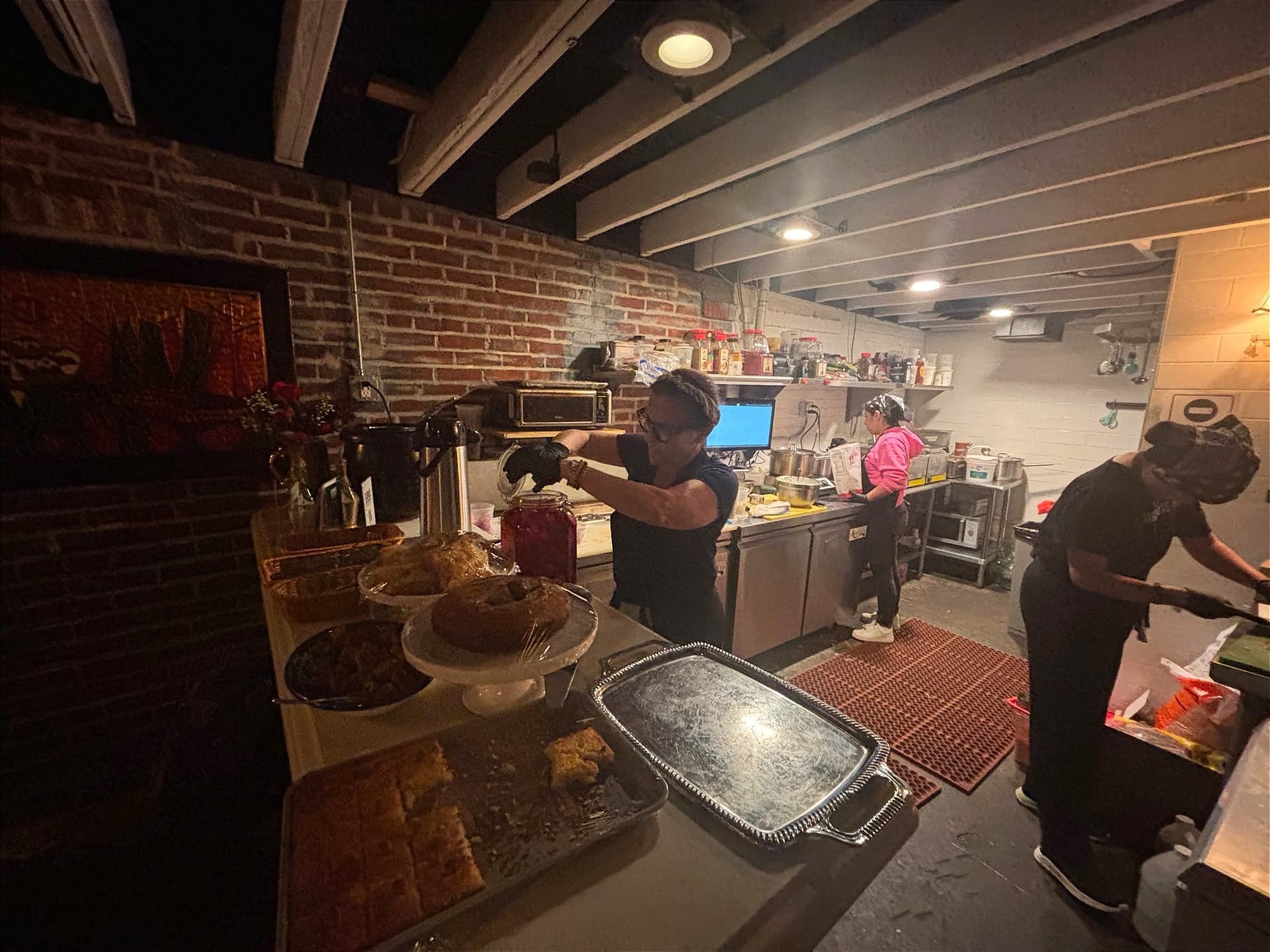Wilson Building Bulletin: A cold dose of reality on D.C.’s budget
And Trayon White gets a new trial date.
Nesrin Abaza says Nabiha isn't just a source of home-cooked food, it's a safe gathering space for local Palestinians and activists.

Amina was walking down U Street with her cousin last September when she was surprised by a huge Palestinian flag billowing above a small restaurant near the intersection with 17th Street. “That wasn’t there yesterday,” the 23-year old, who requested that only her first name be used, recalls saying.
They stepped in and the restaurant’s owner, Nesrin Abaza, 64, immediately welcomed them in Arabic. “She was showing us all the photographs and we're like: ‘Wow, this looks like our family's home.’ All the little details. We felt immediately comforted.”
Abaza served them knafeh, a traditional Palestinian dessert involving pastry dough layered with cheese that’s soaked in a sweet syrup, and chai. Amina said she and her cousin were “quite literally brought to tears.”
Amina, whose father’s family is originally from the West Bank, asked on the spot if Abaza was hiring. “I never wanted to leave,” the Georgetown Arab studies graduate student said. She joined the staff just a week later.
That’s the type of connection and community Abaza wants to create with her home-cooked food. She wants it to be a refuge for the diaspora, while also painting a different picture of Palestinians than many get from the news or social media.
Abaza calls Nabiha a “protest restaurant.”
“We’re in the nation’s capital that’s funding a genocide, and we want people to see Palestinians as human beings, not as numbers on the TV screen and bodies,” she said.
“We have a history. We have a culture. We have a country. We have a flag. We have a cuisine. We are serving love and humanity. It’s a restaurant without walls.”

She named the establishment after her mother who was born in Salfit, Palestine in the West Bank, and who she watched cook traditional dishes throughout her childhood. Abaza was born in Jordan and moved to Greece and eventually the U.S. in 1977 when she was 16. While Abaza has no formal culinary training, she has a business background and has cooked traditional Palestinian dishes for her family and friends for years. Today, she makes her recipes largely from memory, as her mother didn’t write them down. “Memory is flavor,” she said.
Nabiha was born as an act of resistance. Abaza’s husband Mauricio Fraga-Rosenfeld, who owns the adjoining Peruvian restaurant El Secreto de Rosita, and his eldest daughter got into a verbal dispute with U Street neighbors who had been spray painting over pro-Palestinian signs. It ended with the neighbors calling them Hamas. Fraga-Rosenfeld, whose grandfather survived the Holocaust, replied that he’s Jewish. He said his resistance wasn’t about Hamas, it was about humanity.
Fraga-Rosenfeld immediately called Abaza, who was visiting his family in Ecuador at the time. “‘I'm putting up the biggest Palestinian flag on U Street, and you're coming back and you're going to open a Palestinian restaurant,’” she remembers him saying.
Just two weeks later, on Sept. 18, Nabiha opened its doors with the oversized flag flying defiantly over the entrance.

The narrow, dimly-lit restaurant with a small open kitchen in the back is reminiscent of an older relative’s living room, with black and white photographs of Abaza’s family and her mother’s hand-made embroidery donning the brick walls. The feeling resonates with Abaza’s daughters, who come in and say, “OMG it smells like Teta’s house,” using the Arabic word for grandmother.
“You should feel like you're walking into your aunt's house or your grandmother's house, and it's not just the food, but the environment embraces you,” Abaza said. “I'm always giving people hugs or a hot cup of tea.”
It’s turned into a family business. She has the support of her husband, whose restaurant next door honors his Ecuadorian grandmother’s Andean style of cooking, especially her ceviche. Their son is the general manager for both restaurants, their eldest daughter is the head of special events, and the youngest daughter is a server.
The menu is made up of mostly mezzes, or small plates, like hummus and baba ganoush, meant to be shared so diners can sample the “tapestry” of Palestinian cuisine, Abaza said.
One of the menu items is her take on her favorite Palestinian dish - musakhan. It involves a thin bread known as saj layered with sautéed onions, olive oil, sumac and then topped with marinated chicken thighs or legs that you bake and garnish with roasted almonds. Since it’s such a complex dish to make, she makes a version called musakhan wraps, though she hopes to add the full dish as a special request for large groups.

But Abaza wants Nabiha to be more than a source of food. She wants it to be a safe gathering space for local Palestinians and activists, especially as, for many of them, the reality of returning home is becoming more distant as the nearly 18-month war drags on.
“Protest is not just about protesting what's happening right now. It's basically making sure that our Palestinian identity is always present,” she said.
To date, she’s hosted Malala Yousafzai after her foundation’s board of directors meeting in D.C., as well as a screening of the documentary Gaza Is Our Home. She’s also hosted a women’s co-op from Hebron, Palestine, who sold traditional embroidery known as Tatreez.
Abaza purposely uses Arabic names for the dishes, and also sells wine from Palestinian vineyards. “I feel as immigrants we have always been told to adapt,” she said. “So I think it’s time for Americans to adapt also to our cuisines, so I want people to walk out saying the word in Arabic.”
“I don’t want you to order stuffed zucchini, I want you to request it as kousa mahshi. It gives you a different connection. It makes it more real of who we are and our identity.”
Abaza is among a growing group of Palestinian chefs in D.C., including Michael Rafidi, who helms Albi, Yellow, and La Shukran, and Marcelle Afram, who runs the popup Palestinian restaurant Shababi. Ayesha Abraham, who owned the middle eastern restaurant Mama Ayesha’s until she died in 1993, is a source of particular inspiration for Abaza.
“She was an amazing Palestinian woman who actually served the Palestinian community for ages,” she said. “She’s left a gap. That is who I look up to and strive to be like.”
Amina, who is still working as a server at the restaurant, said that education is the most important part. She goes home satisfied that she got to introduce non-Palestinians to maqlouba — a traditional dish involving a green wheat grain called freekeh that is cooked with cauliflower, chicken, and eggplant — which she grew up eating once a week with her family.
“They never had it, and now they associate that bowl of deliciousness with my home in Palestine. That's such a beautiful thing,” she said.
This story has been updated with the correct name of the adjoining Peruvian restaurant, El Secreto de Rosita.
With your help, we pursue stories that hold leaders to account, demystify opaque city and civic processes, and celebrate the idiosyncrasies that make us proud to call D.C. home. Put simply, our mission is to make it easier — and more fun — to live in the District. Our members help keep local news free and independent for all: